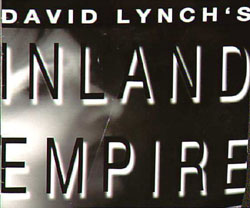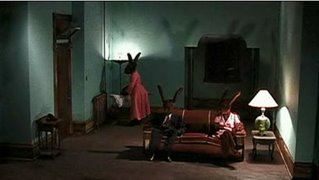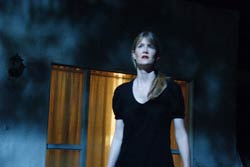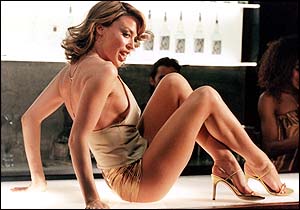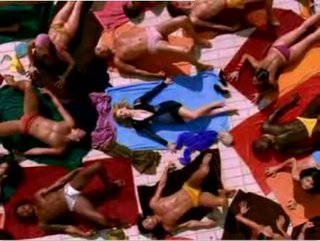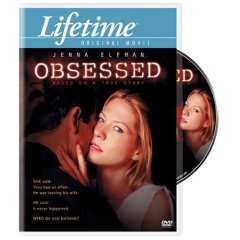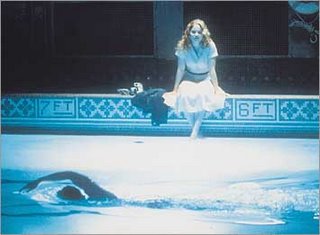Week in Movies Part 1
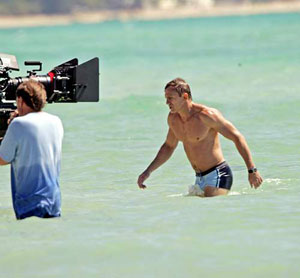 This week long cinema-going extravaganza began with a cheapy screening of Casino Royale which I'm none-too-sure I can deliver a biased judgment of, but then the film isn't so much a film, proper, but a feature-length justification of a very over-hyped, risque decision. The decision, to cast Daniel Craig as James Bond. The verdict, absolute success. In a very similar way as last year's insanely successful Batman Begins (the casting was not that brave, folks), Royale is all about the gritty beginning of that which we already know. 'How'd we get here?' is a question America would seem to be asking itself a lot lately - or perhaps its the last stitch effort to pretend like we've still got a few original ideas. Whatever the case, director Martin Campbell unleashes a fiercely efficient amalgam of Besson-style body action (see District B-13) and your typical James Bond stop the fuel truck with the bomb before it collides with the unveiling of the world's largest airliner stunts. They fuse with the aid of Craig's debonair smirks and cunning. His quiet moments of card playing are just as thrilling as those of big explosions. That was the point of the casting and it comes off really well. But really, this film is meant for one to just gaze upon every part of Craig with insane admiration. And that's something I'm completely willing to do.
This week long cinema-going extravaganza began with a cheapy screening of Casino Royale which I'm none-too-sure I can deliver a biased judgment of, but then the film isn't so much a film, proper, but a feature-length justification of a very over-hyped, risque decision. The decision, to cast Daniel Craig as James Bond. The verdict, absolute success. In a very similar way as last year's insanely successful Batman Begins (the casting was not that brave, folks), Royale is all about the gritty beginning of that which we already know. 'How'd we get here?' is a question America would seem to be asking itself a lot lately - or perhaps its the last stitch effort to pretend like we've still got a few original ideas. Whatever the case, director Martin Campbell unleashes a fiercely efficient amalgam of Besson-style body action (see District B-13) and your typical James Bond stop the fuel truck with the bomb before it collides with the unveiling of the world's largest airliner stunts. They fuse with the aid of Craig's debonair smirks and cunning. His quiet moments of card playing are just as thrilling as those of big explosions. That was the point of the casting and it comes off really well. But really, this film is meant for one to just gaze upon every part of Craig with insane admiration. And that's something I'm completely willing to do.
 With my gluttonous action fare fulfilled, I moved right along to its antithesis - the dialogue driven, why-relationships-are-doomed-to-failure picture. Jeff Lipsky's sophomore picture, Flannel Pajamas is just awful. Seldom do I let loose so clearly and adamantly when it comes to this sort of film, but from the first moments of Flannel Pajamas awkward as ass opening scene, you can sense nothing good will come of this endeavor. Lipsky's snappy dialogue never actually resembles human conversation, instead favoring the "colorful" brand of intellectualism you would hear in a personal monologues delivered by an aspiring would-be Woody Allen, nervous outside of some audition room. At one point, the lead protagonist's brother ends his life. "He was watching Everybody Loves Raymond and he shot himself. I guess he couldn't understand why everybody love Raymond." Unfortunately, this potentially hilarious line is delivered for existential purposes. Instead, it merely found my companion and I roaring in the aisles.
With my gluttonous action fare fulfilled, I moved right along to its antithesis - the dialogue driven, why-relationships-are-doomed-to-failure picture. Jeff Lipsky's sophomore picture, Flannel Pajamas is just awful. Seldom do I let loose so clearly and adamantly when it comes to this sort of film, but from the first moments of Flannel Pajamas awkward as ass opening scene, you can sense nothing good will come of this endeavor. Lipsky's snappy dialogue never actually resembles human conversation, instead favoring the "colorful" brand of intellectualism you would hear in a personal monologues delivered by an aspiring would-be Woody Allen, nervous outside of some audition room. At one point, the lead protagonist's brother ends his life. "He was watching Everybody Loves Raymond and he shot himself. I guess he couldn't understand why everybody love Raymond." Unfortunately, this potentially hilarious line is delivered for existential purposes. Instead, it merely found my companion and I roaring in the aisles.
As the film progresses, some poignant observations are made at the intricacies of relationships, but without any understanding or compassion towards the impetus of the relationship, the viewer can do little with these matured glimmers of realism. This was obviously a story that Lipsky thought necessary to tell, but really, at two very long hours, editing and an appropriately distancing gestation period would have been key to pulling off this potentially interesting project. God knows it's been done before, but, to quote some sage whom I cannot recall, assholes are like snowflakes - there's no two alike. Just, if you're fresh off the failed-relationship wagon, allow yourself some time for retrospection before you make me relive your foibles. I've my own to deal with, thank you very much.
 And speaking of failed relationships, a new Mexican Queer art film, El Cielo Dividido (Broken Sky) purports that love is always destined to ill-fated missed connections and wrong moves which haunt your for the remainder of your existence - which is ultimately what the two-and-a-half-hour film feels like. Don't get me wrong, I'm all for really long films. Warhol, I'm there. Betty Blue, sign me up! But Broken Sky's fatal brand of languid turgitude and cinematographic wizardry kills any sort of essential beauty the film achieves (and it certainly does that, in quietly fleeting moments). So intent is the film on its melodramatic self-importance that our scrumptious youths are swallowed by the immense weight of their trivial experiences. Of course, on some level, first and all-consuming love is the greatest thing in the world. But there's a sense that these two young lads will never overcome the relationship which ended as briskly as it began. Trudging about their apartments in a depressive haze, their demeanor is enough to make The Smiths sound like Kylie Minogue.
And speaking of failed relationships, a new Mexican Queer art film, El Cielo Dividido (Broken Sky) purports that love is always destined to ill-fated missed connections and wrong moves which haunt your for the remainder of your existence - which is ultimately what the two-and-a-half-hour film feels like. Don't get me wrong, I'm all for really long films. Warhol, I'm there. Betty Blue, sign me up! But Broken Sky's fatal brand of languid turgitude and cinematographic wizardry kills any sort of essential beauty the film achieves (and it certainly does that, in quietly fleeting moments). So intent is the film on its melodramatic self-importance that our scrumptious youths are swallowed by the immense weight of their trivial experiences. Of course, on some level, first and all-consuming love is the greatest thing in the world. But there's a sense that these two young lads will never overcome the relationship which ended as briskly as it began. Trudging about their apartments in a depressive haze, their demeanor is enough to make The Smiths sound like Kylie Minogue.
The film's main flaw, however, is its cinematographic schtick: camera locates figure and within the same shot, pans to find said figure in another location. The magic of cinema. This magic defeats itself after we endure it 50 or so times, though. It ceases to hold any metaphoric significance and instead starts to read like a wink from a supremely chuffed filmmaker. Which is really too bad. It's nice that somewhere, someone is making Queer film outside of the self loathing status-quo. I was glad to have supported this film as I sat through the insipid preview for Eating Out: Sloppy Seconds . At least Broken Sky was artfully made. Too bad it wasn't good.
